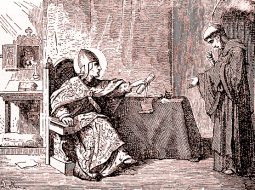Lives of the Saints
Our Models and Protectors
Spiritual Bouquet:
April 12

Saint Julius I
Pope
(† 352)
Saint Julius was by birth a Roman; he was chosen Pope on the 6th of February in 337, and was remarkable for the sanctity of his life and his zeal in strengthening the Christian faith.
The impious heresy of Arius was progressing dangerously everywhere in the East, and many holy bishops were obliged to leave their sees. Saint Julius received them warmly in Rome, Saint Athanasius in particular, and he defended them to the end against their adversaries. He condemned the synods which the Arians had assembled in Tyre and in Antioch, with the intention of abolishing the faith of Nicea. He assembled two councils in Rome, where he heard the exiled bishops and proclaimed their innocence.
By his counsel, the Emperor Constans, the pious prince of the West, influenced his brother Constantius to recall Saint Athanasius from exile.
Saint Julius rejected a deceptive formula of faith, imagined by the Eusebians, who were partisans of Arius at the second council of Antioch. He assembled the second Council of Sardica, composed of both Western and Oriental bishops. His legates presided there, and he saw to it that useful measures for the maintenance of the Catholic faith and the re-establishment of ecclesiastical discipline were drafted and implemented.
He built two basilicas in Rome and adorned them with sacred paintings. He had three cemeteries constructed, on the Flaminian and Aurelian ways, and at Porto. He regulated legal questions concerning the clergy, ordaining that they would plead nowhere but in ecclesiastical courts.
Saint Julius reigned for fifteen years, and died on the 12th of April, 352.
Reflection. The great Popes have all pleased God by their outstanding humility. When the Lord gives the graces of a good administrator to souls, He requires in them more than ordinary virtue, for it is His Authority which they merely share, by His permission. He does not permit that they attribute their success to their own imaginary powers.
Les Petits Bollandistes: Vies des Saints, by Msgr. Paul Guérin (Bloud et Barral: Paris, 1882), Vol. 4.